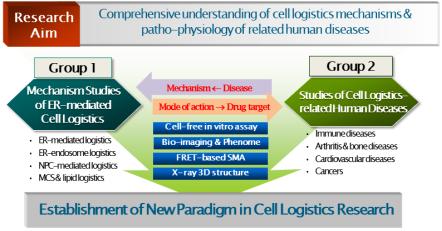Cell Logistics Research Center
Center Overview
Cell Logistics Research Center is established to achieve the following aims:
- To elucidate molecular mechanisms underlying cellular logistics pathways that mediate transfer materials between intracellular organelles.
- To elucidate patho-physiological mechanisms underlying various diseases caused by defects in cellular logistics and develop novel technologies for treating diseases by regulating cell logistics in patients.
Research Subject
Research Achievements
- Mechanistic insight into the nucleus -vacuole junction based on the Vac8p-Nvj1p crystal structure, PNAS (2017).
- Crystal structure of Mdm12 reveals the architecture and dynamic organization of the ERMES complex, EMBO Reports (2016).
- Notch regulates BMP responsiveness and lateral branching in vessel networks via SMAD6, Nature Communicati ons (2016).
- Epigenetic regulation of Kcna3-encoding Kv1.3 potassium channel by cereblon contributes to regulation of CD4(+) T-cell activation, PNAS (2016).
Expected Contribution
- Scientific impacts:
Studies of cell logistics will provide new and innovative theories in this research field and thus contribute to establishment of new principles and paradigm shifts in the related biomedical science fields.
- Practical impacts:
Technologies and methodologies for treating cell logistics-related human diseases developed by the center-driven researches will be applied to development of diagnostic tools and treatments for the diseases.
